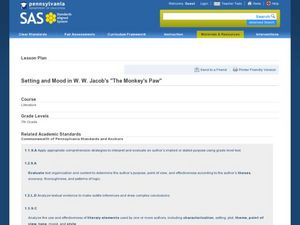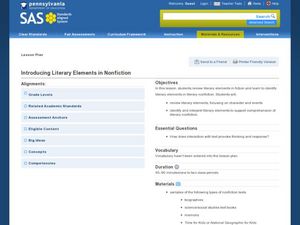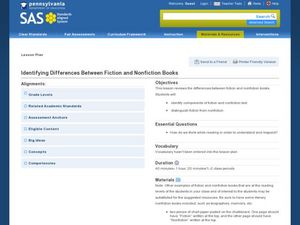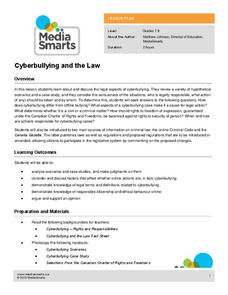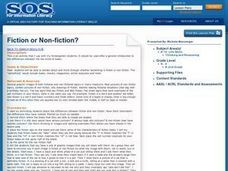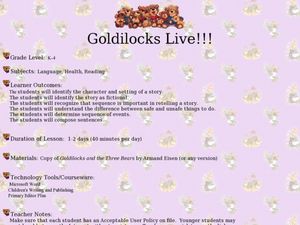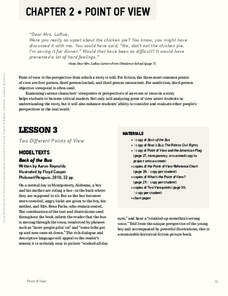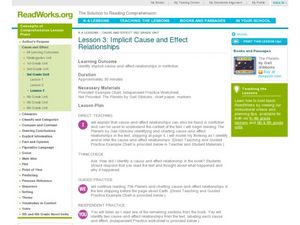Pennsylvania Department of Education
Comparing Key Ideas and Details in Fiction and Nonfiction
Students recognize the differences between fiction and nonfiction texts. In this genre study lesson, students discuss what nonfiction means and write the definition. Students listen to a read aloud and vote whether the text is fiction or...
Pennsylvania Department of Education
Exploring Key Ideas and Details in Fiction and Nonfiction
Third graders participate in activities to differentiate fiction from nonfiction. For this fiction lesson, 3rd graders describe the elements of a fiction story. Students compare and contrast fiction and non fiction elements. Students...
Civil War
Civil War Medicine: Fact or Fiction
Young historians compare the presentation of medical care during the Civil War in passages from fictional and nonfictional texts. They examine passages from Gone with the Wind by Margaret Mitchell and Soldier's Heart by Gary Paulsen, and...
Curated OER
Fiction vs. Nonfiction
Students find the difference between fiction and nonfiction. In this fiction/nonfiction lesson plan, 1st graders read the story Johnny Appleseed and discuss what makes this a nonfiction story. They listen to a fiction story and see...
National Council of Teachers of English
Timelines and Texts: Motivating Students to Read Nonfiction
With the emphasis on incorporating more nonfiction in language arts classes the question arises about how to design activities that motivate kids to engage with informational text. How about an assignment that asks class members to...
Curated OER
Greed is Good?
From Mr. Merdle to Mr. Madoff? A viewing of the PBS adaptation of Charles Dickens’ “Little Dorrit” launches an examination of greedy characters in literature and a study of greed, unfairness, and economic hardship today. The richly...
Curated OER
The Importance Setting and Mood in Fiction
Seventh graders examine the setting in pieces of fiction. In this story analysis lesson, 7th graders investigate the setting in fictional stories and the importance it has. Students discover new vocabulary terms applying to storytelling.
Curated OER
Introducing Literacy Elements in Nonfiction
Explore nonfiction writing with your class. They will identify elements in nonfiction by reviewing elements of fiction. Then they use biographies, memoirs, menus, Time for Kids, and text books to identify elements of nonfiction. They...
Curated OER
Historical Agency in History Book Sets (HBS)
Study historical events by combining the study of historical fiction and non-fiction. Learners read about true past events in historical fiction novels and then research non-fiction accounts of the same events. What are some differences...
Curated OER
Identifying Differences Between Fiction and Nonfiction Books
Students explore the differences between fiction and non-fiction book. In this genre study lesson, students read examples of fiction and non-fiction and identify the characteristics of each genre. Students list the characteristics on a...
Curated OER
Where Do We Begin?
Primary learners grasp sequence of events by discussing morning routines and reviewing the story of Little Red Riding Hood. They explore the necessity of correct order of events. As a class, create a story with a beginning, middle, and...
Media Smarts
Media Awareness Network: Hate or Debate?
Discuss the difference between legitimate debate on a political issue and arguments that are based on hate through a science-fiction scenario that shows how a controversial issue can be discussed in both ways. Then learn how purveyors of...
Curated OER
The Learning Network: Poetry Pairing July, 21, 2011
Although not a complete lesson plan, this set of emotionally powerful texts could be used in a variety of lessons. From The New York Times' Learning Network site, the resource includes a poem, an excerpt from a New York Times article and...
Media Smarts
Cyberbullying and the Law
Dealing with the very topical subject of cyberbullying, this lesson plan will surely create some engaged discussion in your classroom. Young learners discuss the laws concerning cyberbullying in Canada, and then respond to a series of...
Curated OER
Retelling Main Event in Sequence
Second graders practice retelling events from a fiction book. In this reading comprehension lesson, 2nd graders read Harry and the Lady Next Door and retell the main events of the story to a partner.
Curated OER
The Purpose and Power of Persuasion
Examine the power of persuasion and have learners consider how it influences events in their own lives. After reading and analyzing informational texts to understand the author's purpose, class members take a written test and craft a...
Curated OER
Introduce Vocabulary: A Picture Book of Abe Lincoln (Adler)
The story of Abe Lincoln serves as the backdrop to this vocabulary-in-context activity as you read David Adler's A Picture Book of Abraham Lincoln. Scholars learn these politically themed words before listening to you read the story...
Curated OER
Fiction or Non-fiction
Third graders view three texts, A DAY IN THE LIFE OF A FOOTBALLER, THE HUMAN BODY, AND WHICH IS WHICH? with the titles covered. They discuss whether the books are non-fiction or fiction and try to come up with suitable titles for the books.
Curated OER
Goldilocks Live!!!
Study story elements with your young learners. Read Goldilocks and the Three Bears and discuss the order of events by making a story panel out of butcher paper. Sentences are given as suggestions for the panel, though you may compose...
Curated OER
History: Fact of Fiction?
Students find a historial novel online and distinguish between fiction and nonfiction books. They research three historical events related to their novel and write a letter to a figure from their novel's time period.
Curated OER
Introduce: Comparison and Contrast
Class discussions can really make concepts come to life. The class discusses the differences between compare and contrast, read a book, then talk about ways they can compare events or characters in the story. Good leading question are...
Scholastic
Point of View
The point of view in a story can dramatically change the story itself. Focus on finding the points of view in various reading passages with a language arts packet, which includes fiction and nonfiction text.
Curated OER
One * Two * Three * Story
Second graders explore sequencing by drawing events of a story in order. In this sequence of events instructional activity, 2nd graders are read a story such as "The 3 Little Pigs", they recall the events from the fairy tale in order,...
Curated OER
Implicit Cause and Effect Relationships
Cause and effect relationships can be found in both fiction and non-fiction texts. As they read the book, The Planets by Gail Gibbons, learners keep an eye out for cause and effect relationships. They chart all of the causes and effects...








